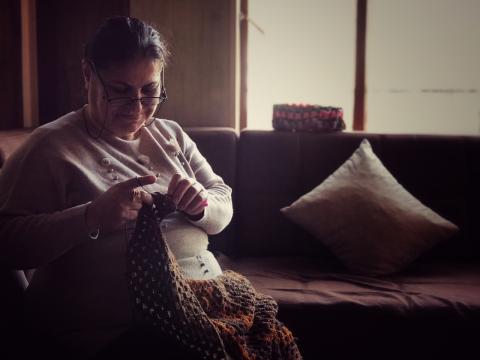Memories are bittersweet, but life continues

Rich childhood memories of her hometown of Bartella, 22 km away from Mosul, are always in her mind. Bartella is where she lived her whole life. Today, she vividly remembers her life on the farm, her walks in the open air, and the games and laughter with the other girls from her hometown. Life was simple, stable, and everything was going by peacefully.
Montaha comes from a farming family of twelve. “Life was beautiful then. More beautiful than now. We were farmers and lived a simple farm life. It was nice and sweet. We wouldn’t dwell too much time thinking about this and that” shared Montaha. At 20, Montaha got married traditionally, and there was, as in any other wedding ceremony of her town, trumpets and drums and it was a colourful day of celebration.
Once married, life got more challenging. Montaha had eight children, four boys and four girls. She also supported her husband, Youssef, with his work to make ends meet. Because of their difficult living conditions, Montaha was also obliged to work in various odd jobs to earn money. She would also make tomato paste and have Youssef sell it in the grocery store. In those days, she was heavily burdened with work and was always tired only to make ends meet. She is incredibly regretful that seven of their eight children did not complete their education. She shared bitterly, “Unfortunately, my children were deprived of school because of our difficult living conditions.” Only her younger daughter, who just got married, is in the final year of high school as her brothers and husband worked and supported her. Nevertheless, Montaha feels proud of her persistence. She continued, “They (her children) are now sad that they cannot read and write. It isn’t easy. Very difficult.”
The years passed slowly for Montaha and her family in those harsh conditions until the conflict started in their area. Then, the family’s already unforgiving lives got exponentially worse. When Montaha and her family learned that conflict was reaching them, they fled along with other families and relatives in her hometown to the Kurdistan Region of Iraq. They stayed in one of the churches in Ainkawa in Erbil, 64 km away from Bartella. During those years of conflict, Montaha and her family moved numerous times until they finally settled in one of the informal settlements in Erbil. During their displacement, Youssef and the sons went in the family car to sell shoes to earn a bit of money to live. The church and charitable people provided them with the funds to help them make ends meet.
On the same day the end of the conflict was announced, Youssef decided to return to their hometown because it was the only place he longed for and felt comfortable. So they returned but were shocked by the devastation they witnessed in their hometown. What little they had built over the years were lost. Youssef became sick, and shortly after, he had a heart attack and passed away. Montaha shared, “Their father died from sadness because there was no property left, and it was challenging. Would you not feel sad also?” “Every day, we cry and feel sadness, but that is life.”
Today, at fifty-six, Montaha is a widowed mother of eight. Six of her children are now married. Her children live with their families in their own homes. Her two unmarried sons and she live with one of her married sons. He has a wife and a child. They are six people living in one house.
Montaha suffers from Psoriasis, a chronic, genetic disease of the immune system that appears on the skin often as red, scaly patches that itch and bleed. She treats her condition with chemicals, which are prohibitively expensive for her. Her sons support her through the income they gain from their work to pay for the costly treatment.
Earlier this year, Montaha participated in a Food Security project that World Vision Iraq implements in partnership with Iraq Humanitarian Fund. With the money (Cash Plus) she received, she covered the cost of her medical treatment, contributed to her family’s needs, bought knitting wool and expanded her project of knitting clothes to sell. Montaha had always had an interest in knitting, but this time through her project, she could produce more and sell to a larger pool of customers. Before Montaha received the cash, she participated in a two-day business training. Today, she watches videos on the internet to get ideas for her project. Montaha shared, “I already had the interest in this, and I get ideas from the internet and do it. When I just got married, I was knitting, but it is not like now. Now there is YouTube, and I do more. One can learn more nowadays. I sell mostly to relatives.” She knits per occasion, and her marketing strategy is word of mouth. “It is better than before, and I was able to pay for the wool I bought.” Shared Montaha.
A small grant like this can help make a huge difference for families like Montaha’s who have difficulty making ends meet yet are burdened with the cost of medical treatment and the uncertainty of future finances.
Montaha’s joy in life is her children, and she hopes that they all have their own houses one day. According to the head of sub-district of Bartella, after the conflict 2000 homes were destroyed in Bartella. In 2021 - 2022, World Vision Iraq with funding from Iraq Humanitarian Fund expanded its operations to Ninewa plains where it distributed cash grants paired with agriculture and business training in Bartella town. The project supported 46 vulnerable persons like Montaha in Bartella and 300 indirect beneficiaries such as family members.